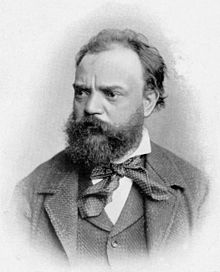Antonín Dvorák
| Born | 8 September 1841
Nelahozeves, Austrian Empire
|
|---|---|
| Died | 1 May 1904 (aged 62)
Prague, Austria-Hungary
|
| Works | List of compositions by Antonín Dvořák |
Antonín Leopold Dvořák (/d(ə)ˈvɔːrʒɑːk, –ʒæk/ d(ə-)VOR-zha(h)k; Czech: [ˈantoɲiːn ˈlɛopold ˈdvor̝aːk] ; 8 September 1841 – 1 May 1904) was a Czech composer. He frequently employed rhythms and other aspects of the folk music of Moravia and his native Bohemia, following the Romantic-era nationalist example of his predecessor Bedřich Smetana. Dvořák’s style has been described as “the fullest recreation of a national idiom with that of the symphonic tradition, absorbing folk influences and finding effective ways of using them,” and Dvořák has been described as “arguably the most versatile… composer of his time”.
See More :

Dvorák (1841-1904) is, arguably, the greatest of the Czech composers. His music has remained popular in the concert hall ever since it was written. Despite this popularity, Dvorák was very self-conscious about his music. Being a contemporary of Brahms, not to mention his friend, it’s understandable. When Dvorák composed his most ambitious symphony, No. 7, he asked his friend what he thought of it. Brahms had championed Dvorák’s music since 1874 when the latter entered some scores in a competition. Brahms was equally encouraging about the Seventh, which Dvorák had said should “stir the world.” In his later life, Dvorák taught at the National Conservatory of Music of America in New York. He lived in Greenwich Village from 1892 until his death.
All pieces: |
||||
|---|---|---|---|---|
| Album Leaf B 158 | E-flat Major | 1888 | 3 | |
Source by: pianosintheparks.com



Leave a Reply
Want to join the discussion?Feel free to contribute!